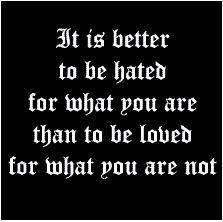Thursday, September 11, 2008
Invisibility
Why must people pretend to not see the color of my skin? I am not defined solely by my skin color, but it is an important part of who I am. Political correctness, the desire to be color blind, or whatever else you want to call it, it's offensive. I am a proud African-American woman, and to pretend not to notice is to deny an important part of my identity. Please don't do that. And don't raise your kids to feel uncomfortable mentioning or acknowledging that someone looks different from them. It makes it seem like difference is somehow bad or wrong, and they will grow up and be the kind of people who think they're being sensitive by not acknowledging the fact that the Black woman in the room is the only one who doesn't look like everyone else. It's ok - I'd rather be different than invisible.
Subscribe to:
Post Comments (Atom)









5 comments:
It may be offensive but it's the liberal's PC movement that has caused things like that to happen. On the other hand, I also think that black people are too sensitive to such things and read entirely too much into what's going on. You said yourself that you're not defined by the color of your skin, so if someone fails to acknowledge that, how does that make you invisible? And how exactly would you want someone to acknowledge the fact that you are the only black woman in the room?
The more I read your post the more confused by it I get. It sounds to me like the color of your skin does define you and you need to have that acknowledged before you can comfortably participate in any further discourse.
Your point is very clear and understandable. After reading this post I immediately remembered something fromone of the books I read this summer for an education course that I took. In "Other People's Children: Cultural Conflict in the Classroom," the author highlights this same point of "invisibility" that you write about when one's skin color is not acknowledged.
She stated: "... with well-intentioned educator's not only our children's legacies but our children themselves can become invisible. Many of the teachers we educate, and indeed their teacher educators, believe that to acknowledge a child's color is to insult him or her. In her book "White Teachers," Vivian Paley openly discusses the porblems inherent in the statement that I have heard many teachers - well intentioned teachers-utter, "I don't see color, I only see children." What mesage does ths statment send? Thatthere is something wrong with being black or brown, that it should "not" be noticed? I would like to suggest that if one does not see color, then one does not really see children. Children made "invisible" in this manner become hard-pressed to see themselves worthy of notice."
Sorry that was lengthy but I think it adequately supports your point. I totally get that youre not saying that your skin color is your sole identity but it is part of it and to not have it acknowledged or treated like mentioning it is a crime is to deny that your skin color is a part of who you are. And I believe to deny any part of a person is to in some way deny the the person.
I dont think as people of color we read too much into this, we are afterall living in a nation where we have long been "defined" as unworthy on the sole basis of skin color. The fact is we are not far removed from it still. Isnt that afterall part of the problem with this current election? Part of whether or not some will or will not vote for a particular candidate is based on skin color or gender.
Long comment here, thanks for indulging me. Anyway, its nice to see another person of color seeing being black as something to be proud of rather than something to be ashamed of.
I'm not sure at all what suggested that I couldn't comfortably participate in discourse - I did continue to participate in the meeting and I was not particularly uncomfortable at the moment - I reflected on it later. I am very used to being the only Black person in the room and for the most part it no longer makes me uncomfortable. What makes me uncomfortable is when someone, in their attempt to be PC or sensitive or whatever, acts as though my Blackness is something to be ignored.
For example, I had a kid tell his mom that I'm African-American in front of me, and the mom basically told him that he shouldn't have said that and that there's nothing wrong with me because I'm Black, although nothing that he said suggested that he thought that - he was just making an observation. The mom apologized to me later, as though her son's observation of my skin color was potentially offensive to me. It wasn't, as I told her 'well, I AM African-American'. That kind of stuff is unnecessary, because acknowledging my Blackness shouldn't be taboo.
I know your posting is a little old but in preparation for a class I came across a quote and again thought of your "Invisibility" entry.
The quote states: "For the white person who wants to know how to be my friend...the first thing you do is forget that I'm Black. Second, you must never forget that I'm Black." - Pat Parker
Also, Jaxx asked a two-part question that you never answered that I think is important to race relations in this country. Jaxx's question: "...if someone fails to acknowledge that (your blackness), how does that make you invisible? And how exactly would you want someone to acknowledge the fact that you are the only black woman in the room?
I like that quote. I guess along those lines, for me, ignoring my Blackness is a matter of failing to acknowledge it when the situation calls for it. Failing to acknowledge the differences between our skin color and therefore some of the differences in our life experiences is failure to acknowledge. To be able to say 'we're different, help me understand what that means' is to acknowledge. The thing is, as people we are so different and yet so similar that it really is a balance. We all put our feet in our mouths sometimes, I think the key is just for it to be truly an accident of the head and not the heart.
Post a Comment